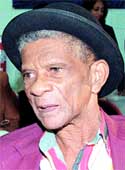'Preedie' dies in his sleep
Terry Joseph
January 24, 2002
ALRIC FARRELL, better known by his calypso sobriquet Pretender, died in his sleep Tuesday night, after battling with a combination of serious illnesses for some time.
"Preedie", as he was fondly called by fellow calypsonians and close friends, was, at 85, said to be the oldest calypsonian alive.
A horse-racing enthusiast, he had been a lifelong friend of the late Grandmaster Kitchener, with whom he shared that passion for the track.
He began singing calypso at age 12, ironically with an ode to a young girl whom he promised to meet on resurrection day, a song he sang at the Redhead Sailor calypso tent.
This was his debut in 1929 and he remained onstage until the early nineties when cancer of the throat conspired with other illnesses to render him quiet. Recollecting that his parents often considered him a blemish on the family for singing calypso, Farrell was equally determined to succeed at the art. Titling himself The Pretender (during a game of marbles with the agreed expert in the district), he continued regardless.
Even in the winter of his years, Pretender maintained his slim necktie, suspicious glances, overall decency and a peculiar use of his fedora onstage.
At the end of each sung chorus, he would cock the hat backward then, as the band played its interlude, move it closer and closer to horizontal before lifting it altogether and placing it squarely on his head just in time for the next verse.
If anyone, Preddie was in the premier position to comment on calypso. He had been onstage at the first calypso competition in 1939, running third to Growling Tiger.
He had sung alongside the greats of the art's golden years, there in the first calypso competition of 1939, coming in third to Atilla and Kitchener in the 1946 national contest, singing well before the end of World War II a song about the possibility of a West Indies Federation.
In 1954 he rubbed shoulders on the Dimanche Gras stage with The Mighty Spoiler, Sa Galba, Panther, Lord Melody and Warlord Blakie and, in the following year, with an equally powerful field of contestants, finished seventh with the song "Why BG Will Not See Royalty."
When the phenomenal rise and consequent win of the 1956 general election by the People's National Movement (PNM) party dominated calypso lyrics of the following year, Pretender sung an unrelated ditty at the 1957 final.
Based on the ballad "Que Sera Sera" (from which it got its name), the calypso used the song's chorus to win for him the only national calypso title in a career that spanned more than 60 years.
In 1961 he was in the final once again, forced this time to bow to the Mighty Dougla.
1969 was his last time as a contestant on the Dimanche Gras stage, passing the baton as it were to newcomers Black Stalin, Young Creole, The Mighty Power, Psycho and Chalkdust. Duke, who in the year previous had begun what turned into a beaver-trick, ran off with the crown.
He won the first national extempo crown in 1973, one year after receiving the Public Service Medal of Merit Silver for calypso and became the benchmark in that genre. In 1994 he was awarded the Humming Bird Medal (Gold) for his contribution to Trinidad and Tobago's culture.
His hallmark song "Never Ever Worry" was first recorded in 1961 and more recently redone as a duet with Brother Resistance.
Yesterday, speaking for the Trinbago Unified Calypsonians Organisation (TUCO), of which he is general secretary, Resistance said: "Pretender was one of the legends of calypso and a supreme master in the art of extempo. Trinidad and Tobago has lost a cultural icon. His exploits and achievements will for a long time form part of our cultural legacy as well as our national history."
In his turn at extending condolences to Pretender's family, National Carnival Commission chairman Kenny de Silva said: "The passing of Pretender is a great and substantial loss. He would frequent the racing pool next door to my downtown store and invariably come up with a couple of extempo lines on me, my staff or the business place. We had become close personal friends in the latter years as we shared the common love for horseracing. I am sure I speak for us all in the Carnival sphere when I say we shall miss him."
Previous Page / Terry's Homepage


